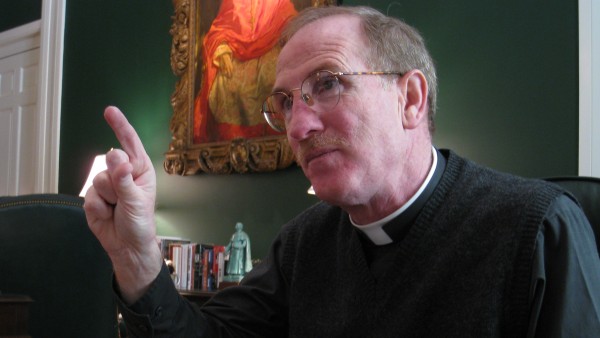McShane Condemns Sexual Assault Against Females in Monthly Address
University President Rev. Joseph M. McShane addressed the question of “Who is the Fordham community?” in an email on Oct. 15.
March 30, 2015
In an email letter addressed to the Fordham Family, President of the University Rev. Joseph McShane, S.J., spoke not about the preparations for Holy Week or the upcoming Easter holiday, but of campus sexual assault. At 12:20 p.m. on Monday, March 30, McShane called the men reading the message to imagine “what it is like to be on the receiving end of assault,” while telling women sexual assault “is never your fault.”
McShane did acknowledge non-heteronormative and non-male perpetuating assaults, parenthetically stating: “Let me note that I am fully aware that women can sexually assault men, and that same-sex assaults occur: they are as unequivocally wrong as men’s sexual assaults on women, if far less common.” March being Women’s History month, McShane focused on the assaults against women, which he described as more dominant. The Observer has published the full address in the text below.
While statistics of sexual assault vary, it is commonly accepted that 1 in 5 women and 1 in 71 men will be sexually assaulted in their lifetime, according to the Center for Disease Control and Prevention (CDC). At a recent Fordham College at Lincoln Center (FCLC) Campus Assault and Relationship Education (CARE) event, Director of FCLC Office of Residential Life Jenifer Campbell and Dean of Students at FCLC Keith Eldredge announced that there were 14 reported incidents of sexual assault in the year of 2013.
Tweet us your thoughts about McShane’s address @FordhamObserver and comment below.
The Full Address Here:
Dear Members of the Fordham Family,
March, as I’m sure you know, is Women’s History Month, and the University rightly celebrates it with a number of well-attended events. I write to you this month concerning a darker issue concerning women, and one that is affecting every college and university in the country: campus sexual assault. It is a crime and a sin—I do not use that word lightly—overwhelmingly against women, likely underreported, and emotionally devastating.
To the men reading this—perhaps you are were expecting a scolding, or a list of prohibitions. When, tell me, in the long, sordid history of the world has that ever changed one person’s heart, much less their actions? I could cite scripture. At length. I could tick off dire consequences. I could tell you what not to do in a great many ways, none of which would likely have any effect. No, having made it this far in life, I believe that you know the rules. Instead, let me ask of you something that may not come naturally. I ask that you imagine what it is like to be on the receiving end of a sexual assault. I ask, just for a moment, and just in the privacy of your own mind, to imagine the helplessness, fear, rage, and disgust you might feel if you were sexually attacked, coerced—physically or otherwise—and violated. It is, I realize, an inherently discomforting thing to do, but it is powerful precisely because it is discomforting.
Call it empathy, or the golden rule, or Jesus’ commandment to love one another. However you name it, putting yourself in another’s place—in this case a woman’s place—is an everyday talent that can be cultivated, and that will serve you well your whole life through. I can tell you from many confessions I’ve heard that people are burdened with guilt and shame to the end of their days for offenses smaller than sexual assault. I do not think, in any case, that this is too much to ask. People choose to attend and work at Fordham for many reasons, but an important one is that they find the culture here a congenial one. There is nothing more central to Fordham’s culture than care for the whole person, and few things further removed from our values than sexual assault. (Let me note that I am fully aware that women can sexually assault men, and that same-sex assaults occur: they are as unequivocally wrong as men’s sexual assaults on women, if far less common.)
To the women reading this letter. Let me say that sexual assault is not your fault. It is never your fault. Your judgment, good, bad, or indifferent, neither excuses sexual assault nor mitigates it in the slightest degree. Nothing gives anyone an excuse, much less a right, to violate your boundaries, or to make any sexual contact with you without your consent. Period.
This is not merely my opinion, this is Fordham policy.
The University has extensive and robust mechanisms for dealing with sexual assault and harassment, and if you’re not familiar with them, you should be. They are available on the Fordham website, as are the names and numbers of the appropriate contacts. I’ve appended a list, below.
This is not the most upbeat letter I have ever written to you, perhaps, but it may be among the most important. Women comprise more than half of the campus community—sensational progress since the 1950s, when they were segregated by college and poorly represented among faculty and administrators—but even were women still a small minority, their safety and well being should rightly concern us all.
Thank you, then, for your consideration, your awareness, and your openness to a culture of respect of which we can all be proud.
Sincerely,
Joseph M. McShane, SJ
UPDATED April 16, 2015- The writer of this story changed the headline to read: McShane Condemns Sexual Assault Against Females in Monthly Address. The original headline read: McShane Admonishes Sexual Assault Against Females in Monthly Address.












